| |  | | | Turkey's Increasingly Islamist and Authoritarian Regime; Daniel Pipes: Hamas Must Fall for Palestine to Rise By Winfield Myers ● Aug 04, 2025 Smart Brevity® count: 9.5 mins...2514 words In this issue we analyze the corrupt, dictatorial, Islamist regime of Turkish President Recep Tayyip Erdoğan. Exiled Turkish journalist Abdullah Bozkurt examines Turkey's corrupt spy agency, MIT, as well as its nefarious efforts to silence critics abroad, including his business partner and fellow editor. He also exposes Turkey's refusal to seek justice for ISIS fugitives responsible for the horrific 2015 Ankara bombing that killed 104 innocent civilians. Amine Ayoub and Loqman Radpey round out our coverage of Turkey. In a wide-ranging interview, Daniel Pipes discusses the paradox of how Israel dealt handily with isolated Iran but is confounded by the globally-supported Palestinians. Among his memorable statements: "Eliminating Hamas is the most moral act possible in Gaza. Nothing positive can happen while it retains power." Pipes also examines Islamism, America's universities, and U.S. Middle East policy. We include analyses of Israel and the Palestinians by Lazar Berman and Michael Rubin, with the latter arguing, "If Palestine gets its independence today, the most optimistic scenario would be a South Sudan on the Mediterranean. In all likelihood, it could be far worse." | | Erdoğan Uses Turkish Intelligence Agency MIT to Silence Critics, Threaten Foreign Nations 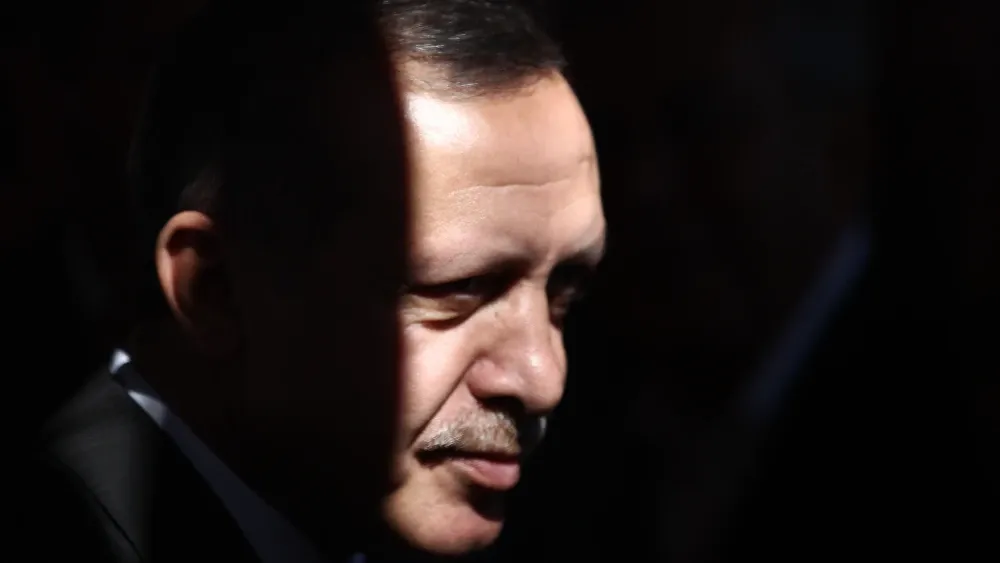 By: Abdullah Bozkurt The Turkish intelligence agency, Milli İstihbarat Teşkilatı (MIT), has has become an increasingly aggressive enforcer of President Recep Tayyip Erdoğan's authoritarian rule, extending its reach beyond Turkey's borders. Why it matters: This transformation underscores MIT's evolution from a traditional intelligence service into a key instrument for both domestic repression and aggressive foreign influence campaigns. Driving the news: MIT agents no longer operate solely within the confines of Turkish diplomatic missions. In many countries with sizable Turkish diaspora communities, the agency has established covert outposts under the guise of journalism, academic institutions, business enterprises, charities, and civil society initiatives. The stakes: MIT's transformation reflects Turkey's accelerating slide into authoritarianism under Erdoğan. The agency's traditional intelligence functions have been subordinated to political imperatives. -
It now serves as an enforcement arm of the regime, weaponized to safeguard Erdoğan's rule, suppress dissent, crack down on rights and freedoms and project power abroad. The bottom line: As long as MIT operates as Erdoğan's personal enforcer, the prospects for human rights and democratic governance remain under severe threat. To read the full article, click here. | | Turkey Refused to Seek Extradition of ISIS Fugitives behind Deadliest Terror Attack 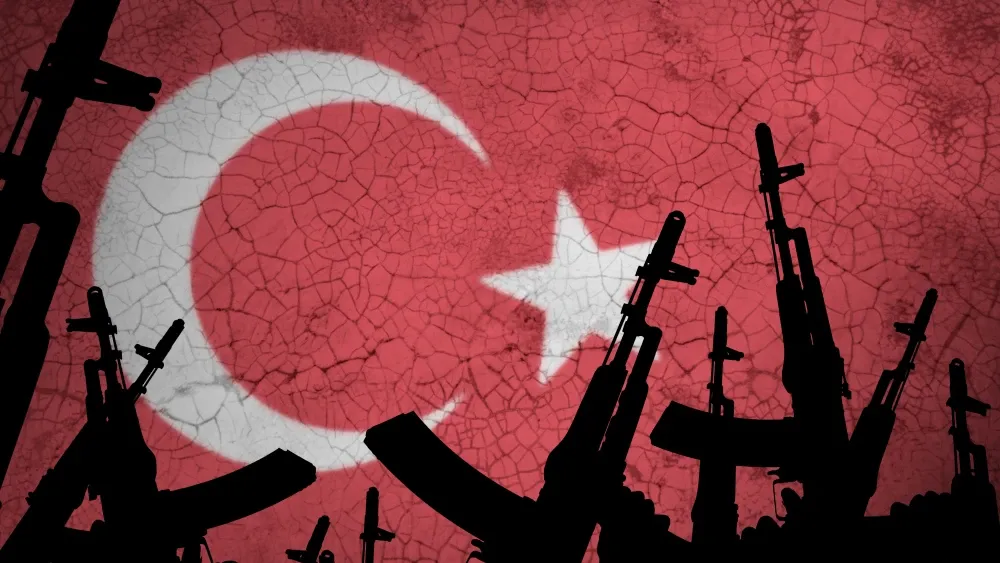 By: Abdullah Bozkurt Despite knowing the whereabouts of fugitives behind Turkey's deadliest terrorist attack, President Recep Tayyip Erdoğan's government has not pursued their extradition from Syria. Why it matters: This inaction demonstrates Turkey's lack of commitment to combating terrorism and highlights a disturbing alliance with jihadist groups. Driving the news: A letter from Turkish Foreign Minister Hakan Fidan confirms Turkey's reluctance to hold these terrorists accountable. The stakes: Analysts suggest Erdoğan fears that prosecuting these fugitives would reveal secret collaborations between MIT and ISIS, potentially implicating his regime in fostering terrorism. The bottom line: The judiciary has repeatedly failed to hold ISIS operatives accountable. Even parliamentary attempts to determine how many convicted ISIS members are serving time in Turkish prisons have been blocked by the government. To read the full article, click here. | | ICYMI: "The Imperial Nature of the Islamic Republic of Iran" with Ahmad Hashemi 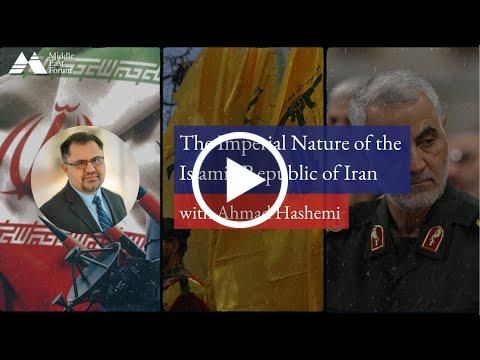 Iran has for centuries constituted a resilient multi-ethnic empire, dominated by Persian imperial ambitions. It survived the 20th-century collapse of similar realms like the Ottoman and Austro-Hungarian empires. Today, this imperial nature persists, though it is now cloaked in Islamist garb. The Tehran regime perpetuates subjugation through ethnic apartheid, proxy militias, and the expansionist Iranshahr ideology—mirroring historical quests for dominance akin to Russia's "Russian World" or Nazi Lebensraum. Yet, as religiosity fades and ethno-nationalism rises among oppressed Kurds, Azerbaijanis, Baluchis, and others—fueled by protests, economic ruin, and escalating Israeli airstrikes in 2025—demands grow for dismantling this apartheid empire, and its transformation into democratic nation states. How might supporting ethnic minorities to shatter Iran's imperial core redefine its role in the region? What opportunities and challenges could this pose for Israel's security, alliances with Arab states, and the vision of a balanced, post-imperial Middle East? Ahmad Hashemi is a freelance analyst and graduate student in strategic intelligence studies at the Institute of World Politics. His work focuses on Iran, Azerbaijan, and Middle Eastern foreign policy issues. He has written for a number of print and online publications and he is a regular commentator on Iranian politics, Azerbaijan, and regional affairs. He holds a B.A. in political science from the University of Tehran, an M.A. in regional studies from the School of International Relations in Iran, and an M.A. in defense and strategic studies from Missouri State University. To watch the full podcast episode, click here. | | Turkey Secretly Plots to Bypass INTERPOL Rules to Target Exiled Journalist in Sweden 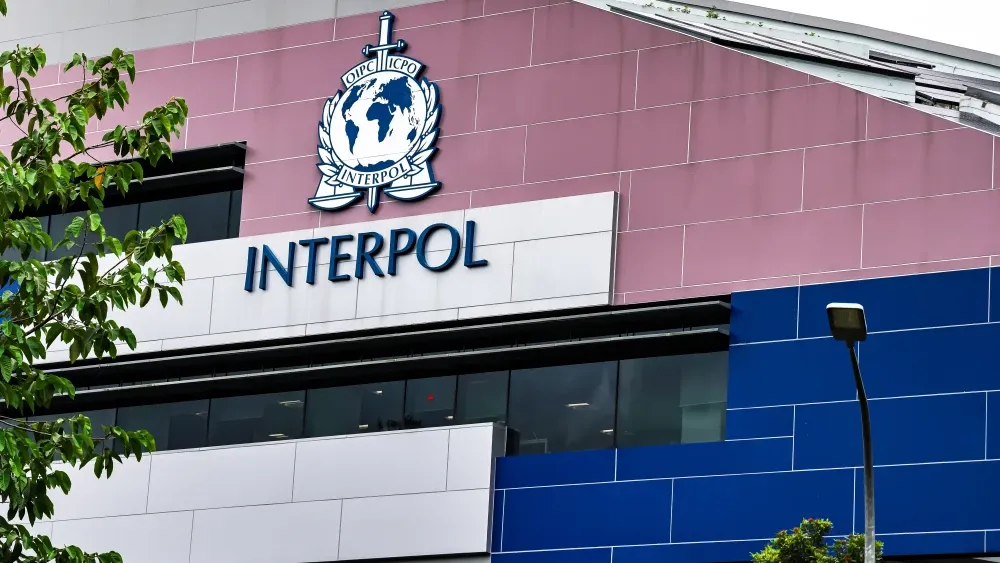 By: Abdullah Bozkurt A classified memo from Turkey's Security General Directorate reveals covert attempts to bypass INTERPOL rules to obtain a Red Notice against exiled journalist Levent Kenez, editor of Nordic Monitor, of which Abdullah Bozkurt is executive editor. Why it matters: This tactic highlights Turkey's ongoing efforts to stifle dissent and manipulate international institutions to target critics of President Recep Tayyip Erdoğan. -
Turkish authorities aim to exploit INTERPOL's system by omitting references to political charges and emphasizing other accusations to secure Red Notices. -
Such actions undermine the integrity of international legal frameworks and threaten freedom of the press. Driving the news: The memo is signed by the deputy head of the Interpol-Europol Department within Turkey's Security General Directorate. The stakes: The Erdoğan government's relentless crackdown on the Gülen movement, inspired by the late Muslim cleric Fethullah Gülen, is not recognized by democratic nations as legitimate. The bottom line: The leaked memo illustrates how Turkish authorities are actively seeking to harass journalists living in exile, human rights activists and political dissidents. To read the full article, click here. | | MEF Action Alert: Stop Turkey's F-35 Purchase 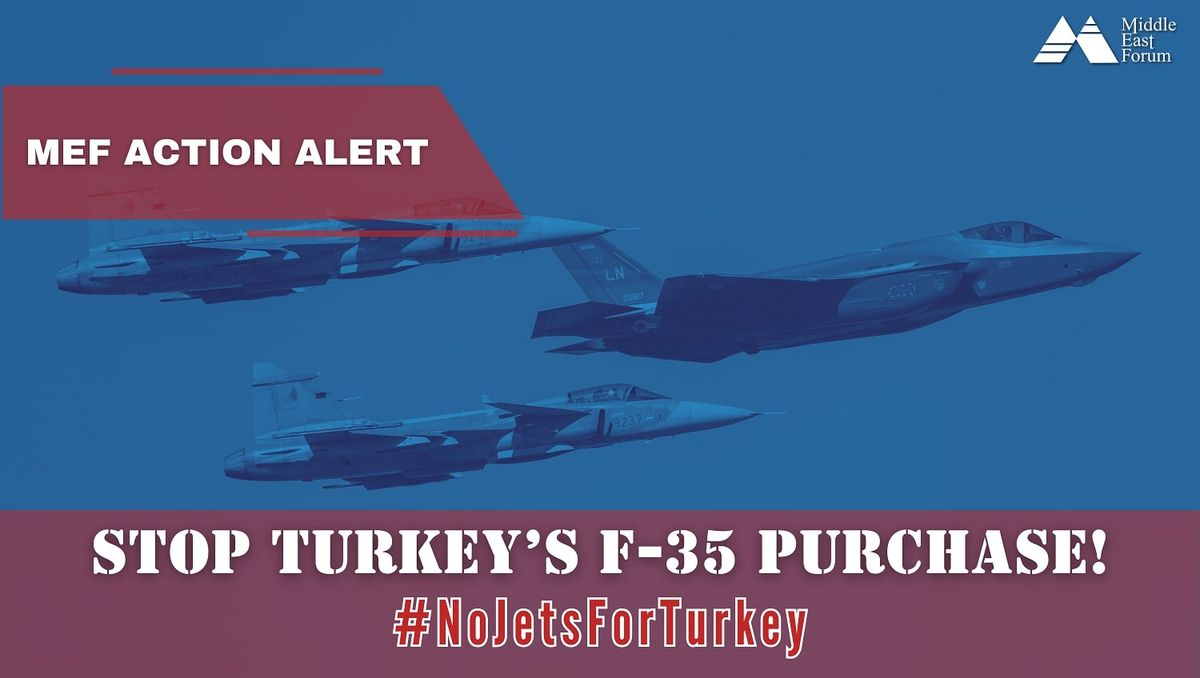 Turkey is pushing to rejoin the F-35 program despite owning Russia's S-400 missile system, which threatens U.S. aircraft and risks exposing sensitive F-35 technology to Russian intelligence. In response, member of Congress are circulating a Dear Colleague letter that calls on Secretary of State Marco Rubio to deny an F-35 arms deal with Turkey under the 2017 Countering America's Adversaries Through Sanctions Act (CAATSA), which formally removed Turkey from the F-35 program in 2019. This is a critical moment. Allowing Turkey back without removing its S-400s endangers U.S. national security, undermines our defense industry, and compromises Israel's Qualitative Military Edge. We must not reward Turkey, which continues to host Hamas leadership, attack U.S. allies in Syria, and threaten the territorial integrity of Greece and Armenia. The F-35 is vital for U.S. aerial superiority and global defense partnerships. Act Now! Urge your House Representative to sign the letter to Secretary Rubio demanding the White House reject Turkey's F-35 bid and uphold CAATSA sanctions. Time is short—Turkey's actions threaten U.S. interests and must not be rewarded. Sign up now to protect our military secrets and defense leadership! Click here to sign up for our letter-writing campaign to demand Congress reject Turkey's F-35 bid and uphold CAATSA sanctions. | | Beyond Hagia Sophia: Turkey's Christians Face Erdoğan's Unrelenting Islamization 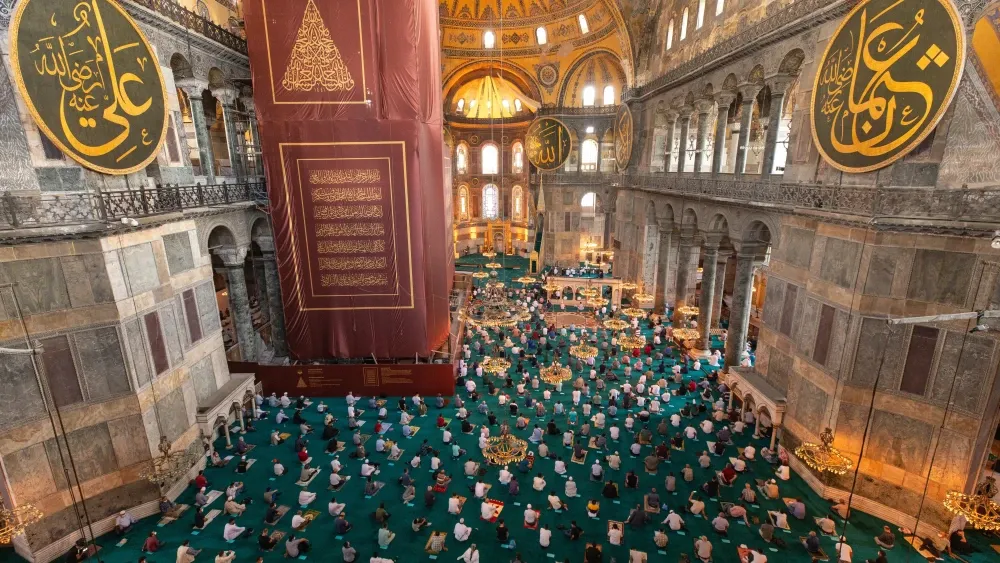 By: Amine Ayoub The Islamic call to prayer from former Christian churches in Turkey symbolizes a deeper transformation under President Recep Tayyip Erdoğan's leadership, marginalizing the nation's Christian minorities. Why it matters: This calculated embrace of Turkish-Islamic nationalism redefines Turkish identity, casting non-Muslims as "other." Driving the news: The Open Doors World Watch List, which tracks Christian persecution globally, ranks Turkey 45 out of the top 50 nations worldwide where persecution is worst. The stakes: The state-run Directorate of Religious Affairs (Diyanet), with its immense budget and influence, overwhelmingly promotes Sunni Islam, further cementing its dominant position and marginalizing other faiths. The bottom line: Turkey's pluralism and soul hang in the balance as Christians strive to practice their faith amid rising Islamization. To read the full article, click here. | | Is Turkey's War Against the Kurds Over? 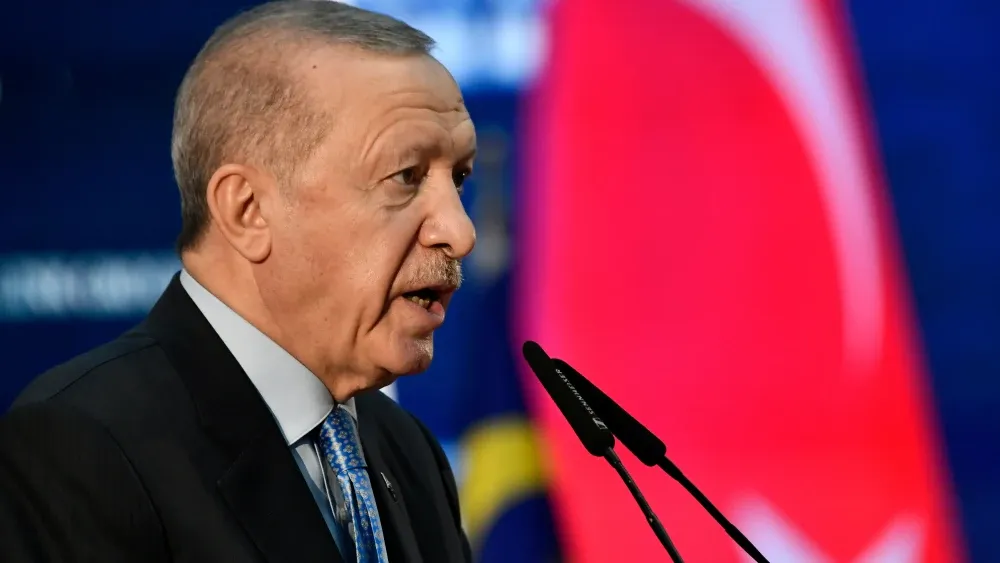 By: Loqman Radpey Following Abdullah Öcalan's, the imprisoned founder of the Turkey-based Kurdistan Workers' Party (PKK), call to disarm, 30 guerrillas symbolically burned their weapons in Slêmanî, a historic symbol of Kurdish independence movement in the 1920s, signaling a historic shift. Why it matters: This move masks a deeper strategy by President Recep Tayyip Erdoğan to manipulate Kurdish-Turkish relations for political gain. Driving the news: Under the guise of counterterrorism, Turkey's military expansion in Kurdish regions reflects a pattern of occupation, threatening regional stability. The stakes: Erdoğan's deal with the pro-Kurdish Democracy Party may offer superficial concessions, but avoids addressing systemic issues of Kurdish rights and identity. -
Kurds across Iran, Turkey, Iraq, and Syria must unite against Erdoğan's divisive policies that threaten their achievements and status. The bottom line: To prevent irreversible damage to Kurdish achievements, authorities of Kurdistan Regional Government and Kurdish-led Autonomous Administration of North and East Syria must urgently form a security, military, intelligence, and economic pact, engaging the Kurds in Iran and their parties too. To read the full article, click here. | | Interview with Daniel Pipes: Hamas Must Fall ... For Palestine to Rise  Interviewed by: Bikash C. Paul In an interview with the New Delhi Post, Daniel Pipes discussed the complex dynamics of the Middle East, focusing on Israel's challenges, the Abraham Accords, and the distinction between Islam and Islamism. Why it matters: Israel is in a paradoxical situation—successfully countering Iran but struggling with Palestinian issues due to differing global dynamics. -
Iran, despite its nuclear aspirations, remains isolated, while Palestinians enjoy a uniquely powerful global support network that includes the government of France. -
The Abraham Accords have shown resilience, suggesting a shift towards enduring mutual benefits. Driving the news: It is important to distinguish between Islam and Islamism; Pipes advocates for a concerted effort against the latter as a totalitarian ideology. The stakes: Pipes warns of a potential Islamism 2.0, led by the governments of Turkey, Pakistan, Bangladesh, and Malaysia. This means an Islamism less violent, more sophisticated and successful than the earlier and declining version. The bottom line: Pipes calls for a pragmatic U.S. approach in the Middle East, reverting to modest Cold-War-era-style policies such as access to oil, assuring Israel's security, anti-WMD proliferation, and deterring Russia and China. -
Washington retains a preeminent ability to shape in the Middle East. It boasts a unique network of allies. It has the greatest economic and diplomatic sway. And, as the June 2025 attack on Iran nuclear facilities showed, it has an unmatched ability to make war. To read the full interview, click here. | | Causing Strategic, Moral Harm, Netanyahu Lets Others Dictate Israel's Ties with Christians  By: Lazar Berman Israel's relations with the Christian world are strained following a series of incidents, including a U.S. envoy's warning and attacks on religious sites. Why it matters: U.S. Ambassador Mike Huckabee, a strong Israel supporter, threatened to announce Israel as unwelcoming to Christians due to harassment and negative treatment of Christian groups. -
Huckabee's threat to encourage American Christians to avoid Israel and reciprocal U.S. visa actions highlights diplomatic tensions. -
The ambassador visited the Christian Palestinian town of Taybeh in the West Bank, the scene of repeated attacks by settlers, including setting fire to the fields around the ruins of the historic Church of St. George and a nearby cemetery. Driving the news: An Israeli tank shell hit Gaza's only Catholic church, killing three and injuring Father Gabriel Romanelli, prompting global condemnation. The stakes: These incidents follow years of harassment and vandalism against Christians, risking Israel's global standing amid rising antisemitism. The bottom line: To maintain its global alliances and uphold its image, Israel must address these crises and ensure protection for religious minorities. To read the full article at the Times of Israel, click here. | | Independent Palestine Would Be a Disaster for Palestinians 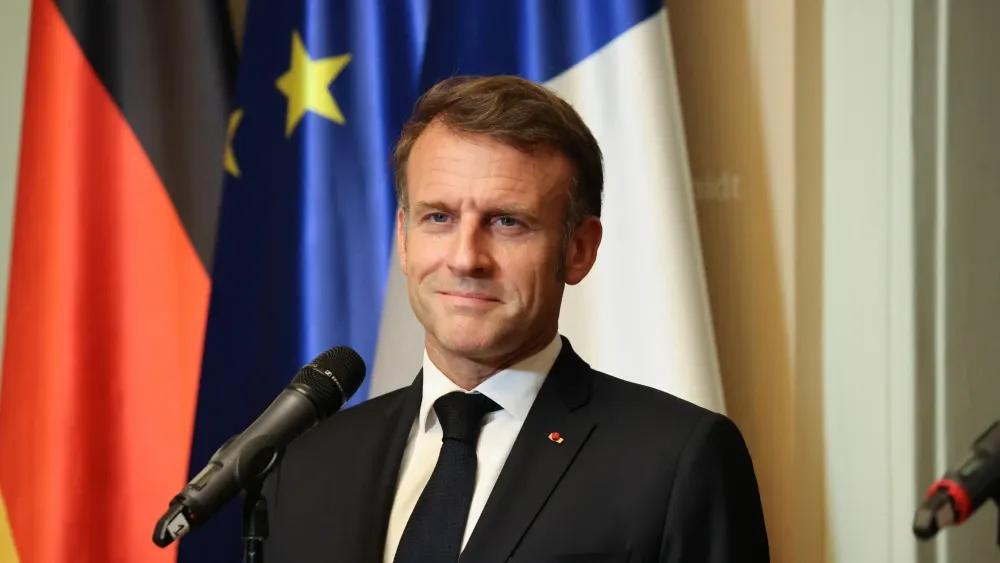 By: Michael Rubin On July 24, 2025, French President Emmanuel Macron recklessly recognized a Palestinian state, hoping to appease Muslim voters in France rather than uphold French laicism. Why it matters: If it requires throwing Jews under the bus, Macron is happy to be the second coming of Marshal Philippe Petain, the head of Vichy France. It is easy to endorse Palestine. It may be much harder to stomach what comes next. -
There is only one certainty: An independent Palestine will be a disaster for Palestinians. Should the international community cudgel Israel into accepting a Palestinian state in the West Bank, Gaza, and Jerusalem, the result will be a morass of misery. Driving the news: Macron's endorsement focuses blindly on Palestinian independence without addressing governance failures, as seen in regions like Eritrea and Kosovo. The stakes: While success stories like Somaliland exist, Palestine's trajectory is poised for greater turmoil, potentially far surpassing South Sudan's plight. The bottom line: If Palestine gets its independence today, the most optimistic scenario would be a South Sudan on the Mediterranean. In all likelihood, it could be far worse. To read the full article, click here. | | Thank you for reading the Dispatch; we hope it was useful in understanding the complex issues central to MEF's mission. If you enjoyed it, please pass it along to a friend, and please share your thoughts in the comments. Thank you, Winfield Myers
Managing Editor, Middle East Forum
Director, Campus Watch | | | | Was this edition useful?  

Your email will be recorded and shared with the sender |        MEF, an activist think tank, deals with the Middle East, Islamism, U.S. foreign policy, and related topics, urging bold measures to protect Americans and their allies. Pursuing its goals via intellectual and operational means, the Forum recurrently has policy ideas adopted by the U.S. government.
Copyright © 2024 Middle East Forum, All rights reserved.
Our mailing address is:
Middle East Forum
1650 Market Street, Suite 3600
Philadelphia, PA 19103 | | | | | Powered by 
| | This email was sent by Middle East Forum via Axios HQ | | | |
0 коммент.:
Отправить комментарий